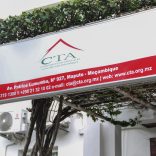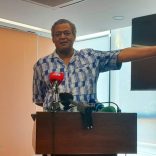Mozambique, World Bank partnership gains momentum as President Chapo meets Ajay Banga in ...
Bank of Mozambique predicts 5.5% economic growth in 2017

Voa (File photo) / The new Bank of Mozambique building in Maputo
The Bank of Mozambique yesterday projected economic growth of 5.5 percent and inflation of 14 percent in 2017, signalling a slight improvement in economic indicators, which have already begun to be felt on the last quarter of this year.
“The economic developments reported in the last quarter of the year indicate an improvement in the indicators, thus opening up more optimistic prospects for 2017, without neglecting to acknowledge that the risks of the domestic and international environment remain high,” said governor Rogelio Zandamela at the close of the financial year press conference at the Maputo headquarters of the central bank.
The Bank of Mozambique governor said that the devaluation of the national currency against the dollar had fallen from 80 meticais in September to the 72, and that the bank had revised its previous forecast of annual inflation from around 30 to 27 percent in December.
“We have strong reasons to believe that inflation has started a slowdown,” Zandamela said, “in a downward trend that will continue in 2017.”
Gross domestic product growth in 2016 should be around 4 percent, against the 6.8 percent registered in the previous year, according to the bank, and international reserves, which were at critical levels with a coverage of only three months, have now increased and cover 3.5 months.
“Between October and December we observed a trend towards the sale of foreign currency to the Bank of Mozambique at the initiative of the commercial banks, totalling about US$174 million, which has no comparison in previous years,” he noted.
In 2017, the governor’s priority was to strengthen of monetary and fiscal policy coordination, and also, referring to the hidden debt scandal which led the International Monetary Fund and partners to suspend their funding, to “reclaim the reputation and credibility of the country and its institutions on the international and domestic levels”.
In this context, Zandamela mentioned the sustainability of public debt, and also peace, which would allow free movement of people and goods and normal economic activity as well as, “within a scenario of unpredictability of external aid disbursements”, an increase in domestic revenue.
“We will continue to work in close partnership with government institutions for the rapid resumption of the Bretton Woods institutions program, which is a priority for building confidence among investors and international markets and for enabling the return of capital flows to the country,” he said.
Another challenge, he continued, “is to make major gas exploration projects in the north of the country an engine of economic diversification”, incorporating small and medium-sized enterprises and using revenues for national agenda priorities.
With the bank of Mozambique having lately liquidated O Nosso Banco and made intervened in Moza Bank, Zandamela gave assurances that the institution would strengthen the supervision of the financial system.
Rogério Zandamela also said that he was negotiating the creation of a single index for the whole banking system with the Mozambican Banking Association to reflect market conditions and “increase transparency in the mechanism for the formation of interest rates that banks charge their clientele”.
Banks would set their interest rates using the index, and their respective spreads would be widely disclosed “so that customers have transparency when taking out a loan”.
Rogério Zandamela said he hoped negotiations with the Mozambican Banking Association would be concluded shortly and would imply an end to the current practice of pegging interest rates to the highest money market rate.












Leave a Reply
Be the First to Comment!
You must be logged in to post a comment.
You must be logged in to post a comment.